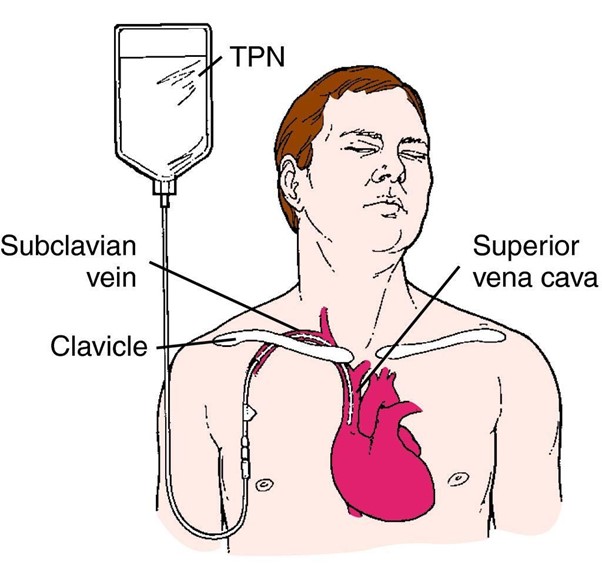After reviewing a client's intake and output record for the last eight hours, the nurse calculates the client's current fluid balance as how many mL? (Enter numeric value only).
0730-8 oz of orange juice, hard-boiled egg, and toast
0830-voided 200 mL
0900-a cup of water
1200-1 cup of soup, tuna sandwich, and 6 ounces of apple juice
1300 vomitus of 100 mL
1400-voided 250 ml
1430-12 ounce can have carbonated beverage.
The nurse is caring for a client who is receiving total parenteral nutrition (TPN). Which finding(s) should alert the nurse that further assessment is needed? (Select all that apply.)
Generalized nonpitting edema.
Hypoactive bowel sounds in all 4 quadrants.
Redness at intravenous site.
Urinary output greater than 30 ml per hour.
Frequent productive cough.
Correct Answer : A,B,C,E
Choice A
Generalized nonpitting edema is correct. Nonpitting edema could indicate fluid retention, and it's important to assess for signs of fluid overload, electrolyte imbalances, or underlying cardiac issues.
Choice B
Hypoactive bowel sounds in all 4 quadrants is correct. Hypoactive bowel sounds could suggest gastrointestinal motility issues, which could be a sign of gastrointestinal complications related to TPN.
Choice C
Redness at intravenous site is correct. Redness at the intravenous site could be indicative of infection, infiltration, or irritation. It's important to assess for signs of infection and ensure proper IV site care.
Choice D
Urinary output greater than 30 ml per hour is incorrect. While increased urinary output could indicate adequate hydration, it's not typically a concerning finding unless there are other signs of fluid imbalance. Top of Form
Choice E
Frequent productive cough is correct. A frequent productive cough could indicate respiratory issues, including aspiration pneumonia, which can be a complication of TPN.

Nursing Test Bank
Naxlex Comprehensive Predictor Exams
Related Questions
Correct Answer is ["A","B","D"]
Explanation
1 whole-wheat tortilla, 4 oz chicken breast, 4 of an avocados, 1/4 cup of salsa
1030
1 cup coffee, 2 tbsp half and half, 1 small apple, 1 tbsp almond butter
1200
1 cup spinach, 4 oz ground turkey with taco seasoning. 1/4 cup cheddar cheese, 2 bananas
1500
6 cashews
1900
1 cup regular soda, 6 oz white fish, 1/2 white potato, 2 tbsp butter, 1⁄2 cup green beans
2200
1⁄2 cup fat-free yogurt, 1/4 cup blueberries
Correct Answer is A
Explanation
Choice A
Serum HDL (high-density lipoprotein) of 35 mg/dL (0.91 mmol/L). Among the options provided, a serum HDL level of 35 mg/dL (0.91 mmol/L) is the assessment data that indicates the need for referral to a nutritionist. HDL is often referred to as "good" cholesterol because it helps remove excess cholesterol from the bloodstream, reducing the risk of cardiovascular disease. In this case, the HDL level of 35 mg/dL is below the recommended reference range for females (greater than 55 mg/dL or greater than 0.91 mmol/L), which could suggest a potential need for dietary and lifestyle interventions to improve cardiovascular health.
Choice B
Serum HbA1c (glycosylated haemoglobin) of 4.8% (0.05) is incorrect. This HbA1c level is within the normal reference range (4% to 5.9%) and indicates good blood sugar control.
Choice C
BMI (body mass index) of 22 kg/m² is incorrect. A BMI of 22 is within the normal weight range and might not necessarily indicate the need for a nutritionist referral.
Choice D
Total serum calcium of 10 mg/dL (2.5 mmol/L) is incorrect. This calcium level is within the normal reference range and might not require a nutritionist referral, unless there are other specific concerns related to calcium intake.
Whether you are a student looking to ace your exams or a practicing nurse seeking to enhance your expertise , our nursing education contents will empower you with the confidence and competence to make a difference in the lives of patients and become a respected leader in the healthcare field.
Visit Naxlex, invest in your future and unlock endless possibilities with our unparalleled nursing education contents today
Report Wrong Answer on the Current Question
Do you disagree with the answer? If yes, what is your expected answer? Explain.
Kindly be descriptive with the issue you are facing.
